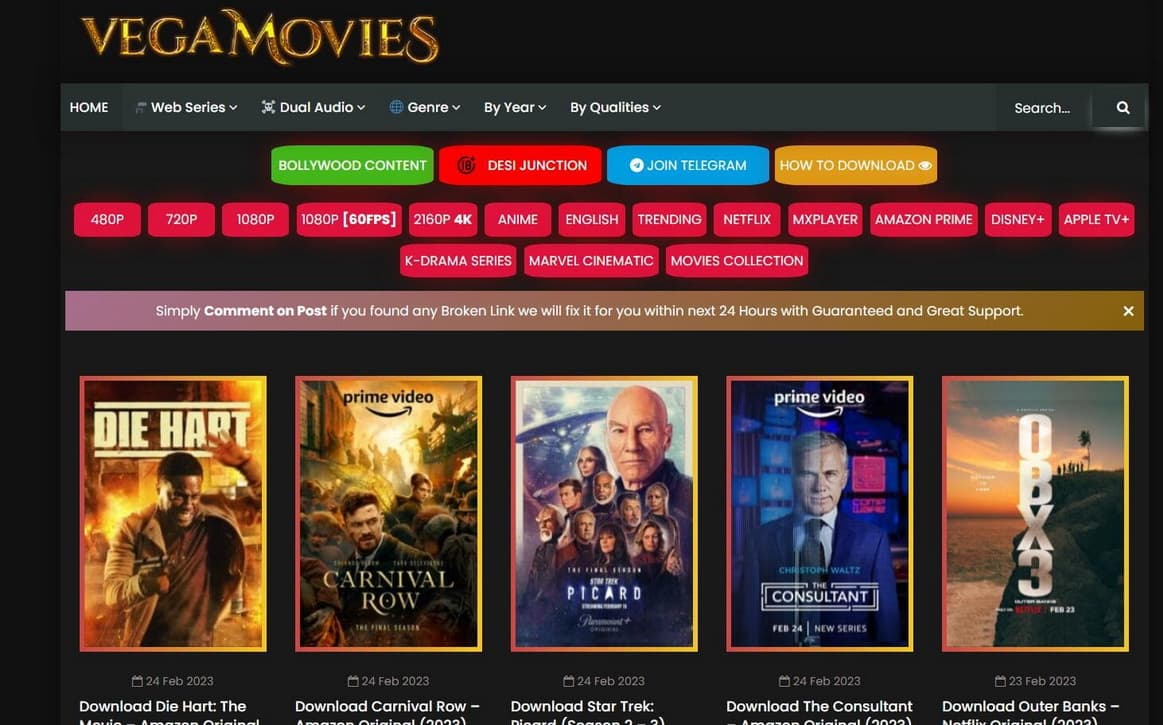Vegamovies Hindi Dubbed Download: Latest Updates & Alternatives
Is the allure of free entertainment worth the potential cost? The prevalence of websites like Vegamovies, offering seemingly boundless access to copyrighted content, raises serious questions about legality, ethical consumption, and the future of the entertainment industry.
The digital landscape, an ever-evolving ecosystem of information and entertainment, presents a paradox. On one hand, the democratization of access allows for unparalleled reach and discovery. On the other, the ease with which copyrighted material can be distributed and consumed without proper compensation for creators has fostered a climate of widespread piracy. Websites like Vegamovies exemplify this duality, offering a vast library of movies and television series, often available in multiple languages and resolutions, for free. This seemingly benevolent offering, however, masks a complex reality with significant implications for copyright holders, content creators, and the very structure of the entertainment industry. The service claims to provide the latest Bollywood releases, Hollywood films dubbed in Hindi, and South Indian films dubbed in Hindi. This vast library, coupled with the promise of easy access and no registration requirements, is undeniably attractive to a large audience. The ability to download movies in various qualities, from 480p to 4K, further enhances its appeal, catering to different internet speeds and viewing preferences. However, these features exist within a framework that operates outside the bounds of legal and ethical content distribution.
Let's delve into the mechanics of such platforms, the challenges they present, and the broader consequences of their existence. The term "Vegamovies" itself, frequently appearing in search results related to free movie downloads, is a key indicator of this phenomenon. The platform, or others like it, often leverages sophisticated techniques to circumvent copyright protections and host content illegally. They typically rely on advertising revenue, often from questionable sources, to sustain their operations. The content itself is often obtained through illicit means, such as ripping from streaming services or other unauthorized sources. This model undermines the legitimate efforts of content creators, studios, and distributors who invest heavily in producing and licensing films and television programs. The financial losses incurred due to piracy can be substantial, leading to reduced investment in new projects, a decline in the quality of content, and ultimately, a contraction of the entertainment industry. The promises of easy access and no registration, while convenient for the user, are built on the backs of artists and professionals who deserve to be compensated for their work.
Furthermore, the potential risks associated with downloading content from such websites are significant. These sites are often riddled with malware, viruses, and other malicious software that can compromise a user's device and steal personal information. The lack of security measures inherent in these platforms makes them prime targets for cyberattacks and data breaches. The desire for free entertainment can, therefore, expose users to considerable risk, potentially leading to financial loss and identity theft. The user's device is not only at risk of being infected but also, the download or streaming could be monitored by authorities, leading to legal repercussions.
The widespread availability of content through these platforms also contributes to a culture of disregard for copyright laws. It normalizes the idea that accessing copyrighted material without paying for it is acceptable. This mindset undermines the value of intellectual property and erodes the foundations of the creative industries. The ease of access often makes it seem as though content is freely available, encouraging users to overlook the legal and ethical implications of their actions. The consequences of such behaviour are far-reaching, potentially leading to a reduction in funding for creative projects and a decline in innovation within the entertainment sector.
The legal battles fought by content creators and distributors against piracy websites are ongoing. The operators of these platforms often employ sophisticated techniques to evade detection and remain operational, making it difficult to bring them to justice. However, legal action is essential in sending a clear message that copyright infringement is a serious offense. The pursuit of legal remedies is vital to protect the rights of content creators and uphold the integrity of the entertainment industry. The struggle against these websites is a testament to the value of intellectual property and the necessity of ensuring that creators are fairly compensated for their work.
In terms of content, Vegamovies is reportedly offering the latest Bollywood releases, Hollywood films dubbed in Hindi, and South Indian films dubbed in Hindi. This wide range of available content has contributed to its popularity, attracting a broad audience seeking entertainment. The convenience of accessing titles in multiple languages, coupled with the promise of high-quality downloads (480p, 720p, 1080p, and even 4K), further enhances its appeal, yet these features do not overshadow the illegal nature of their operation.
The future of the entertainment industry hinges on finding the right balance between accessibility and protection of copyright. This will involve strengthening copyright laws, developing innovative content distribution models, and educating the public about the importance of respecting intellectual property rights. The entertainment industry needs to evolve to combat piracy. Platforms like Netflix, Amazon Prime Video, and other legal streaming services offer a wide range of content at reasonable prices, providing a viable alternative to illegal downloads. These services provide a legal and convenient way to access a vast library of movies and television series. By investing in these legitimate platforms, consumers can support content creators and contribute to a more sustainable and ethical entertainment ecosystem. This could involve a push for legislation that increases penalties for illegal content distribution and greater enforcement of existing copyright laws. Additionally, there is a need for investment in educational programs that raise awareness about the consequences of piracy and promote ethical consumption of content. By working together, the industry and the public can build a future where creative talent is valued and fairly compensated, and where the enjoyment of entertainment does not come at the expense of others.
| Feature | Details |
|---|---|
| Core Functionality | Offers free downloads of movies and TV shows. |
| Content Types | Bollywood, Hollywood (dubbed in Hindi), South Indian films (dubbed in Hindi), web series. |
| Accessibility | No registration is required, making content easily accessible. |
| Download Quality | Offers content in various resolutions: 480p, 720p, 1080p, and 4K. |
| Primary Revenue Source | Advertising, often from questionable sources. |
| Legal Status | Operates illegally by distributing copyrighted content without permission. |
| Risks to Users | Exposure to malware, viruses, and potential legal consequences. |
| Impact on Industry | Undermines legitimate content creators and distributors, contributing to financial losses. |
| Typical User Experience | Easy access to a wide variety of titles in multiple languages, often requiring navigating pop-up ads. |
| Alternatives | Legal streaming services (Netflix, Amazon Prime Video, etc.). |



Detail Author:
- Name : Mr. Martin Leffler III
- Email : fanny.eichmann@bergstrom.info
- Birthdate : 1983-11-15
- Address : 6048 Jacobi Heights Apt. 846 New Jazmyne, MA 86162
- Phone : 520.502.7479
- Company : Stanton-Carroll
- Job : Personal Service Worker
- Bio : Modi vel facilis nemo. Vel sed numquam excepturi ea modi eaque ipsum. Voluptates reiciendis nisi rerum quos quasi. Aspernatur blanditiis rerum et dignissimos at vitae.